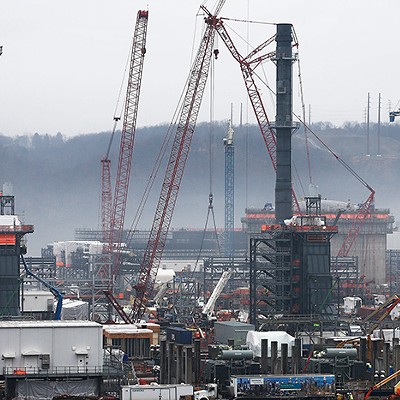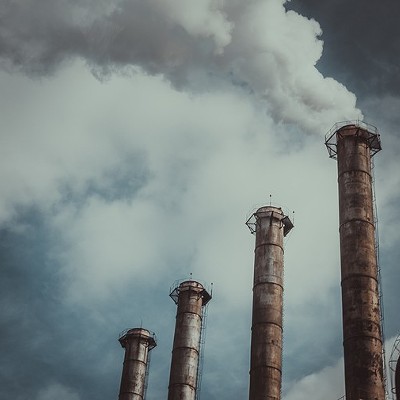Over the years, the Pittsburgh region has made significant strides in improving its air. In 2000, the region’s annual particle pollution was measured at about 21 micrograms per cubic meter. By 2015, that number had decreased to about 12 micrograms per cubic meter, just barely above the threshold set by the American Lung Association, though still a failing grade.
But environmental advocates worry that Allegheny County’s air-quality progress could be stymied by a long-time polluter in Clairton and a new cracker plant, which processes natural gas, coming soon to neighboring Beaver County. The environmental organization PennFuture recently launched an ad campaign targeting Allegheny County Executive Rich Fitzgerald and the Shell cracker plant, set to open in 2020, hoping to pressure them to ensure the region’s air quality keeps improving.
Allegheny County officials say they’re already taking the necessary precautions to ensure air quality will continue to improve, and Shell says it’s taken proactive steps as well. And with state and regional officials praising the economic benefits of facilities like Shell’s cracker plant, a long-term battle between politicians and environmentally minded residents could be on the horizon.
Larry Schweiger, president and CEO of PennFuture, is concerned that Allegheny County is losing its momentum on air quality. PennFuture claims U.S. Steel’s Clairton Coke Works, a facility that produces fuel for steelmaking, committed more than 6,700 air-pollution violations over a recent three-and-a-half-year period. Schweiger says the coke works and Shell’s cracker plant, which refines natural gas into plastic, aren’t industries the region should be supporting. He says the Shell plant could produce up to 522 tons of volatile organic compounds per year.
“It’s not consistent about where Pittsburgh wants to go, in terms of the future,” says Schweiger. “It is important to have a broader conversation about where the greater Pittsburgh region is headed.”
Schweiger hopes that PennFuture’s “Toxic Neighbor” ad campaign will facilitate a robust discussion about the future of air quality. The materials include bus-transit advertisements in the East End and billboards in the North Hills, and feature images of children wearing gas masks. Schweiger wants the ads to encourage county residents to contact elected officials like Fitzgerald, and demand they take additional action to address current and future air-quality issues.
But county officials feel they’re already fighting for cleaner air. Ryan Scarpino, of the Allegheny County Health Department, says the county needs to improve its air quality, but says the ACHD is taking all the steps it can currently take. “Here at ACHD, we are committed to improving the air quality using all the tools available to us,” wrote Scarpino in an email to Pittsburgh City Paper. He says that the county’s air-quality rules are strong.
Pittsburgh still has the eighth worst year-round particle pollution among U.S. metro areas. And ACHD air-quality reports from 2016 show an increase in the amount of days on which ozone concentrations exceeded standards compared to the previous two years. In 2016, there were eight days where ozone concentrations exceeded .775 parts per million, compared to two days in 2014 and two days in 2015. Scarpino notes the especially hot summer of 2016 likely created conditions more favorable to ozone formation, and that some pollutants related to ozone creation were down in 2016 compared to 2014 and 2015.
While Scarpino added that ACHD “must aim to do more than simply meet” U.S. Environmental Protections Agency standards, wrote that he isn’t aware of any air-quality legislation that has been proposed by Fitzgerald or Allegheny County Council.
Shell also defends its cracker plant. Spokesperson Ray Fisher wrote an email to CP detailing Shell’s efforts to address air-quality concerns, which include “stringent leak detection and repair programs” and fence-line monitoring so the public can be made aware almost instantly of air-quality problems. (The fence-line monitoring was made public only as part of a legal settlement between Shell and environmental groups Clean Air Council and Environmental Integrity Project.)
The Shell plant will provide 600 permanent jobs, and has received support and praise from Gov. Tom Wolf, area state legislators and Fitzgerald. Fisher wrote that Shell believes the plant will be a benefit for the region.
“Technological advances have made it possible to create a facility that is enhancing the quality of life in the communities where we live and operate,” wrote Fisher. “Our Shell employees are proud of what we bring to Beaver County and how our products improve many aspects of our lives, including our health, safety, and convenience.”
But since the plant will need an abundant supply of natural gas to operate, Schweiger says that embracing facilities like the cracker plant is sending the wrong message to those wanting to make Southwestern Pennsylvania a green-energy hub.
“We are attracting new clean industries to the region,” says Schweiger. “I am concerned that if we continue on this path, we might lose the attraction to those businesses.”



















